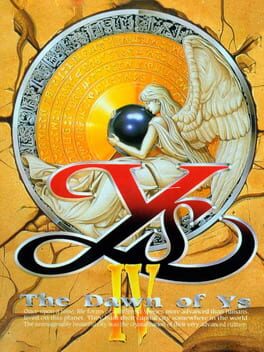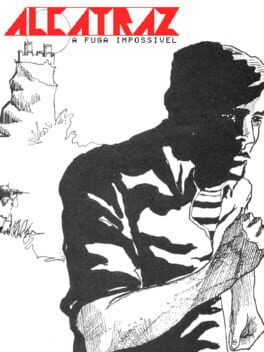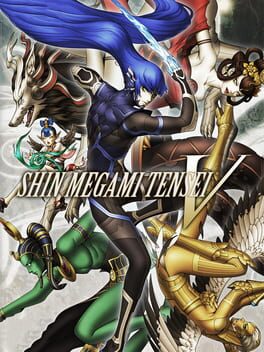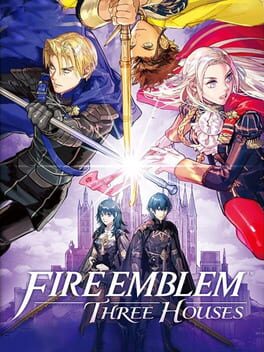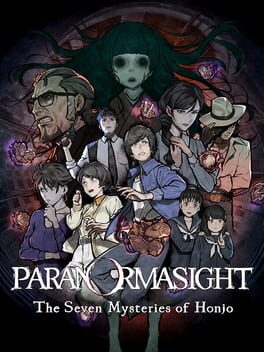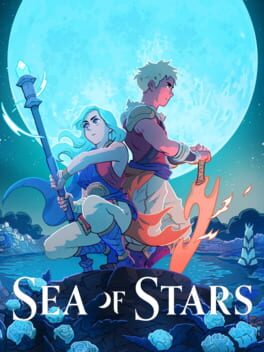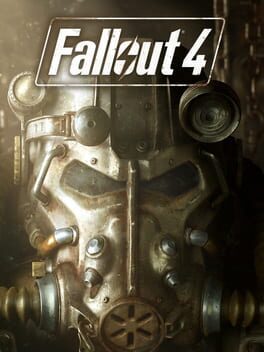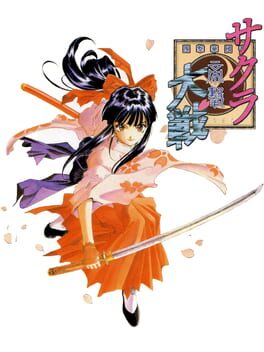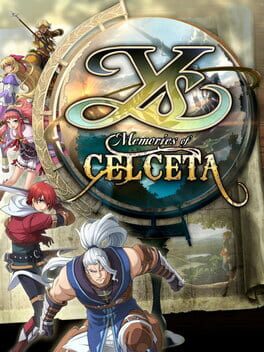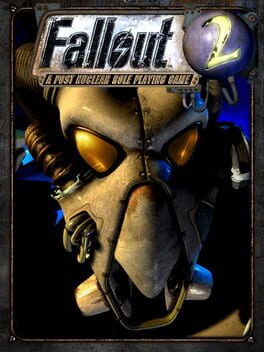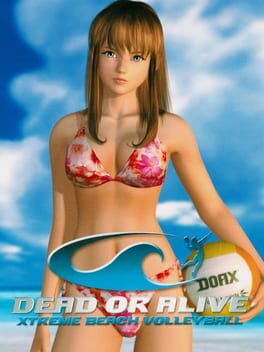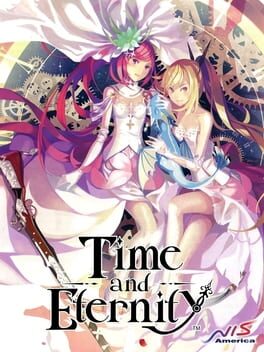etria_girl
154 Reviews liked by etria_girl
Suffers from a clear desire for an 'adventurous' feel. The towns and outside areas in the first few hours are low on character or inventiveness. It's quite deflating walking into an NPC's house, being greeted with a lovely bit of art for them and then realising all they say is a couple dry lines of dialogue (respect to the snake charmer mind you, that's a great Ys NPC). Loved talking to every person multiple times in 1+2 just to see what cascade of goofy lines they would come out with but quickly gave up on that here. Same goes for some of the cutscenes which agan look great while conveying dull plot details that go straight in one ear and out the other. The ramshackle english fandub is a double-edged sword. It provides a lot of quality charm when at its silly best yet equally it can just be, yknow, amateurish in a way that isn't entertaining and hampers portentous moments that could otherwise imbue mystery into the proceedings. The details of the world as you move through it don't spark anything until about halfway through, at which point they start getting more playful in both writing and design. The dungeons never get crazy but they eventually pull some amusing tricks and the little esoteric interactions you can have within the world that made Ys 1 + 2 so likeable show up more as time goes on.
The change made to how bump slash works is theoretically a fine idea - both diagonal bumping and trapping an enemy against a wall were previously basically just an auto-win so let's neuter them and add some tension back into it. Problem is they didn't replace them with anything. Walking direct towards the enemy but slightly off-center is now the only reliable method of attack, which in addition to getting incredibly dull over the course of a full game becomes frustrating for two reasons: 1) you can now go from full health to dead in quite literally two seconds if you just happened to get caught against a wall by an offscreen enemy or their hitbox does something wonky, and 2) the speed at which some enemies move and the narrowness of the confines you often fight them within are not at all suited to this kind of positioning. It ends up being devoid of difficulty or spice and then all of a sudden it's game over for reasons you couldn't foresee. The bosses are mostly solid though, it's just this moment to moment action that grates.
The OST is fantastic, of course. They definitely had the right ideas in many respects but stretched them out too thin in the pursuit of something more grand. The first two games had a sense of marinating in a small set of lovely places with real charm to them. Goof NPCs you're sad to see go at the end. This one is too eager to move forward in an almost linear fashion and spends too much time on the perfunctory as a result. There's room for that approach in the bumpslash-era Ys format but the balance is off here
The change made to how bump slash works is theoretically a fine idea - both diagonal bumping and trapping an enemy against a wall were previously basically just an auto-win so let's neuter them and add some tension back into it. Problem is they didn't replace them with anything. Walking direct towards the enemy but slightly off-center is now the only reliable method of attack, which in addition to getting incredibly dull over the course of a full game becomes frustrating for two reasons: 1) you can now go from full health to dead in quite literally two seconds if you just happened to get caught against a wall by an offscreen enemy or their hitbox does something wonky, and 2) the speed at which some enemies move and the narrowness of the confines you often fight them within are not at all suited to this kind of positioning. It ends up being devoid of difficulty or spice and then all of a sudden it's game over for reasons you couldn't foresee. The bosses are mostly solid though, it's just this moment to moment action that grates.
The OST is fantastic, of course. They definitely had the right ideas in many respects but stretched them out too thin in the pursuit of something more grand. The first two games had a sense of marinating in a small set of lovely places with real charm to them. Goof NPCs you're sad to see go at the end. This one is too eager to move forward in an almost linear fashion and spends too much time on the perfunctory as a result. There's room for that approach in the bumpslash-era Ys format but the balance is off here
That the game begins not with a vision of confinement, visual limits, but with a vision of your prisoner standing against the pale blue of a clear sky is not just an encouraging glimpse of the freedom which eventually awaits you. It's a statement that freedom simply can't exist without structure: one builds one's prison in the process of escaping it, filling more and more of the screen with it until, at the moment of departure, Alcatraz is finally made whole. It's as much a loving tribute to the maze which defined both tabletop and digital games in its time as it is a prescient refutation of the open-world structure which would replace it, a triumph of Apollonian design already pregnant with melancholy as it looks to the long Dionysian night to follow.
In order to better understand the themes of A Fuga Impossível, I think I'd like to take a brief digression to talk about the 2024 Bezos-disfavored visual novel Malcatras' Maiden, which uses these ideas of freedom and structure in a more historicized way, with a greater consciousness of their status as kitsch objects.
The historian Stephanie Larson's argued that Sappho's Fragment 94 is structured to draw parallels between the narrator's feelings for her departing lover and those of Penelope in the Odyssey, to present this affair not as the emphemeral pre-marital love her audience would have understood this kind of relationship to constitute, but as something mythic. This is a reasonable guess; she does something comparable in Fragment 16 by direct analogy to Helen and Paris, but I'm not certain that it matters very much. The content of Sappho's work doesn't seem to have interested the Greeks nearly as much as her composition, and it's difficult to blame them: Fragment 94, when it's rendered faithfully into English by Anne Carson, is a really dull poem. As I see it, the mythologization of intrafeminine sex begins with the Victorians, and that Sappho's role in that mythology has less to do with her own work than the poetry of Swinburne and the illustrations of Simeon Solomon. When we consider that Solomon and Swinburne had both contributed to The Dark Blue, a literary magazine whose only lasting contribution to history is having published Carmilla, it becomes a lot easier to accept that Carmilla is, more than the first vampire novel, probably the first major lesbian novel.
Malcatras' Maiden signals that it's influenced by Carmilla by naming one of its characters for the pseudonym Carmilla adopts during her seduction of the General's ward. The reference seemed tacky at first, especially given the game's frontloading of its most generic and self-indulgent qualities, but it's ultimately earned. Nova appreciates and is able to effectively appropriate the best aspects of that novella: the heady Gothic overstatement of desire and restraint, and the presentation of love as something which makes communication impossible. At its best, when it lets these qualities take over, it's a really worthy piece of exploitation, approached with a kind of genuine investment that makes the prose and the blood-and-nightgown aesthetics feel more fresh and vital than they have any right to.
The game's doesn't really have anything to say about the family, and certainly can't approach incest as a serious theme, but it's able to integrate it into its own internal mythic structure. The game's at its best when it confines itself to that mythology, which is why I was so disappointed by shift into prosaic language and extended JoJo's fights in the last act. The final few minutes of the penultimate chapter are satisfyingly camp, as is the brief epilogue, but the ending's kind of unsatisfying. A story about a character failing to grow might be satisfying in a game that relies less on maximalism and more psychological realism, but this one demanded that the friction between her programmatic and the animal qualities should come to something.
As ever, having a transgender character's prevailing quality be helplessness kind of rankles, but the genre in which it's working does something to warrant it. At the very least, it's worth it for what I interpreted to be a very good joke about Fuseli's The Nightmare. Fantastic soundtrack and animation for a work on this scale.
In order to better understand the themes of A Fuga Impossível, I think I'd like to take a brief digression to talk about the 2024 Bezos-disfavored visual novel Malcatras' Maiden, which uses these ideas of freedom and structure in a more historicized way, with a greater consciousness of their status as kitsch objects.
The historian Stephanie Larson's argued that Sappho's Fragment 94 is structured to draw parallels between the narrator's feelings for her departing lover and those of Penelope in the Odyssey, to present this affair not as the emphemeral pre-marital love her audience would have understood this kind of relationship to constitute, but as something mythic. This is a reasonable guess; she does something comparable in Fragment 16 by direct analogy to Helen and Paris, but I'm not certain that it matters very much. The content of Sappho's work doesn't seem to have interested the Greeks nearly as much as her composition, and it's difficult to blame them: Fragment 94, when it's rendered faithfully into English by Anne Carson, is a really dull poem. As I see it, the mythologization of intrafeminine sex begins with the Victorians, and that Sappho's role in that mythology has less to do with her own work than the poetry of Swinburne and the illustrations of Simeon Solomon. When we consider that Solomon and Swinburne had both contributed to The Dark Blue, a literary magazine whose only lasting contribution to history is having published Carmilla, it becomes a lot easier to accept that Carmilla is, more than the first vampire novel, probably the first major lesbian novel.
Malcatras' Maiden signals that it's influenced by Carmilla by naming one of its characters for the pseudonym Carmilla adopts during her seduction of the General's ward. The reference seemed tacky at first, especially given the game's frontloading of its most generic and self-indulgent qualities, but it's ultimately earned. Nova appreciates and is able to effectively appropriate the best aspects of that novella: the heady Gothic overstatement of desire and restraint, and the presentation of love as something which makes communication impossible. At its best, when it lets these qualities take over, it's a really worthy piece of exploitation, approached with a kind of genuine investment that makes the prose and the blood-and-nightgown aesthetics feel more fresh and vital than they have any right to.
The game's doesn't really have anything to say about the family, and certainly can't approach incest as a serious theme, but it's able to integrate it into its own internal mythic structure. The game's at its best when it confines itself to that mythology, which is why I was so disappointed by shift into prosaic language and extended JoJo's fights in the last act. The final few minutes of the penultimate chapter are satisfyingly camp, as is the brief epilogue, but the ending's kind of unsatisfying. A story about a character failing to grow might be satisfying in a game that relies less on maximalism and more psychological realism, but this one demanded that the friction between her programmatic and the animal qualities should come to something.
As ever, having a transgender character's prevailing quality be helplessness kind of rankles, but the genre in which it's working does something to warrant it. At the very least, it's worth it for what I interpreted to be a very good joke about Fuseli's The Nightmare. Fantastic soundtrack and animation for a work on this scale.
Final Fantasy XVI
2023
A subpar character action game with an embarrassing case of Game of Thrones envy. Zero risk, conviction, or imagination; drained of visual and sonic color a la the Popular Genre Content style it so desperately apes; ceaseless irrelevant worldbuilding painted over with a patina of bleakness to make you feel like you're experiencing something important. Little more than a major victory for marketing and PR, if its reception is anything to go by.
Shin Megami Tensei V
2021
It's another helping of the Shin Megami Tensei fast food we've all come to know and love. Assuming no catastrophic assembly line failure, you always know exactly what you're getting with this franchise; the product is satisfying and reliable. Unfortunately, it's been twenty years since I first emulated SMT1, and given this tendency toward the static, neither the mechanics nor the pet themes hold much interest for me any longer. Hard mode is more artificially difficult than ever, with nothing new to offer veterans except the easily-gamed Magatsuhi critical threat, and until you break the game with Luster Candy/Debilitate you're basically at the mercy of the rigged RNG. I do appreciate the return to relatively austere storytelling, and the concept of an overcrowded pantheon causing Law/Chaos strife is interesting, but at the thematic level this is mostly the same story Atlus has been telling for the six previous games. I'll chalk all this up to "it's not you, it's me" for now, but it's hard to ignore that Megaten is running on fumes at this point, and if Persona 6 is set in a high school again then I'm tapping out for good.
Doesn't help that the game is ugly as sin. You spend 75% of the game wandering through bombed-out, bloom-lit shitholes that are entirely interchangeable save for their color schemes. Dancing Crazy Murder is so good that I almost forgive it though.
Doesn't help that the game is ugly as sin. You spend 75% of the game wandering through bombed-out, bloom-lit shitholes that are entirely interchangeable save for their color schemes. Dancing Crazy Murder is so good that I almost forgive it though.
Pretty patently the best cast of any Fire Emblem game, but then how could it not be? The life-skills social simulator structure allows for unprecedented access to your eager little students: a tea party, a meal in the dining hall, the little notes they leave in the confessional box, impromptu choir practices, and support conversations, my God so many fucking support conversations. Much to do with these blushing moe blobs, not the least of which is working through reliable fantasy chestnuts like class anxiety and religious dogma, all against the ever-palatable school days backdrop. They provide easy access points for understanding the geopolitics at play, fleshing out the setting without an excess of jargon, and when the game eventually stakes its political partisan line they effectively rationalize the silent protagonist's choice of side. I found a lot to dig into and appreciate and I only played one house! When people talk about putting 300, 400 hours into this game, I almost understand them...
...until I start thinking about the gameplay. I play Fire Emblem games for the first time on Normal to get a lay of the land and generally they keep me on my toes without being too dirty or frustrating. Three Houses, however, is remedial, an absolute bore past the first few chapters. You are given an obscene amount of opportunities to accrue tools and buffs specifically tailored to your units; weapons are plentiful and can be repaired on the cheap; and if for some baffling reason you've managed to fuck up all of your students' builds, the game gives you nice little prebuilt units in the second half, some of which are among the game's best. By the time IS starts throwing actual danger at you in the last five hours of the game, you've accrued so many Divine Pulses that there is never any real danger of putting a toe out of line and losing a character, let alone control of the overall situation. Maybe Maddening requires a little bit more gray matter but somehow I doubt it. The emphasis on character development and edge-free gameplay has a pretty obvious motivation: this is as beginner-friendly as the franchise will ever get, an official shift to courting the ravenous fandom kiddies, and the high sales reflect that. It's just unfortunate that the actual gameplay has to be so half-assed as a consequence.
...until I start thinking about the gameplay. I play Fire Emblem games for the first time on Normal to get a lay of the land and generally they keep me on my toes without being too dirty or frustrating. Three Houses, however, is remedial, an absolute bore past the first few chapters. You are given an obscene amount of opportunities to accrue tools and buffs specifically tailored to your units; weapons are plentiful and can be repaired on the cheap; and if for some baffling reason you've managed to fuck up all of your students' builds, the game gives you nice little prebuilt units in the second half, some of which are among the game's best. By the time IS starts throwing actual danger at you in the last five hours of the game, you've accrued so many Divine Pulses that there is never any real danger of putting a toe out of line and losing a character, let alone control of the overall situation. Maybe Maddening requires a little bit more gray matter but somehow I doubt it. The emphasis on character development and edge-free gameplay has a pretty obvious motivation: this is as beginner-friendly as the franchise will ever get, an official shift to courting the ravenous fandom kiddies, and the high sales reflect that. It's just unfortunate that the actual gameplay has to be so half-assed as a consequence.
This must have had an unexpected scheduling or budgetary setback because after the exceptional first couple of hours it nosedives hard into jargon-heavy procedural territory. Once the game hits the daylight section, it brims over with red herrings, underexplored themes, and off-screen endings; it abandons its clever use of 3D perspective and the creeping sense of dread that perspective handily abets; and it tacks the compulsory VN metatextuality onto the ending as if it's embarrassed to even acknowledge it. The characters remain richly written and expressively designed, and you get an interesting feint toward disentangling common cultural mythology as a problem-solving method (think King of Dragon Pass), but when so many of its other ideas fail to even get off the ground, its successes feel accidental. Really disappointing.
Sea of Stars
2023
A few months before this game was released, Yasunori Mitsuda made a blog post saying that he would no longer work with composers outside of his studio. He doesn't mention Sea of Stars explicitly, but considering the feelings he discusses in the post combined with Sabotage's use of his name to promote a game that he only contributed twenty minutes of music to, the experience was likely an alienating one for him. One minute you're a hired hand on a retro RPG, the next you're the linchpin for a set of insurmountable nostalgic expectations.
I lead with this because it's an effective symbol for Sea of Stars' haphazard approach to "borrowing" from its influences. It isn't that Mitsuda's music is better than the rest - although some of the tracks in this are plodding Quest 64 pisstakes that I certainly wouldn't want to be associated with - but that the game tries to staple it and any other homage material onto itself as though the magic will still hold without any kind of context. The fact that the reference exists is paramount; the meaning that the reference supported in its original incarnation is unnecessary. This is most egregious in the empty story, twenty-five hours of plot for plot's sake, and though I won't spoil the game/waste my time belaboring how this fails in its many attempts to emulate Chrono Trigger, I will say that everything from start to finish(es) around Garl is spectacularly mishandled. Expecting me to care about someone named Garl is already an insane ask; making him this insipid and one-dimensional to boot puts the nail in the proverbial coffin.
When the game does step outside of its comfort zone and attempts synthesis or originality, it finds some success. Though I don't love the sickly lighting or the overly busy palettes, this is still an impressive graphical achievement. The first journey across the Sea of Stars gave me a little sensory rush that this medium rarely does anymore. As a mechanical experience, its interesting resource management and strong second act ultimately collapse under its balance issues, shallow growth and equipment progression, and lack of difficulty. The emphasis on combos as a means to round out the tiny movepools falls flat because outside of Mending Light they have no utility beyond breaking an awkward lock. Your best option half of the time is just a supercharged Moonerang anyway, so most combats play out the same way, and boss fights are often too long.
I think this might hit for a young or novice RPG player, but it would also be a shame to start them here when Chrono Trigger et. al. are so much richer and more meaningful. This is mostly just branding-first pay-to-play nostalgia and its rapturous reception will probably look like Kickstarters' remorse after a few years of hindsight.
I lead with this because it's an effective symbol for Sea of Stars' haphazard approach to "borrowing" from its influences. It isn't that Mitsuda's music is better than the rest - although some of the tracks in this are plodding Quest 64 pisstakes that I certainly wouldn't want to be associated with - but that the game tries to staple it and any other homage material onto itself as though the magic will still hold without any kind of context. The fact that the reference exists is paramount; the meaning that the reference supported in its original incarnation is unnecessary. This is most egregious in the empty story, twenty-five hours of plot for plot's sake, and though I won't spoil the game/waste my time belaboring how this fails in its many attempts to emulate Chrono Trigger, I will say that everything from start to finish(es) around Garl is spectacularly mishandled. Expecting me to care about someone named Garl is already an insane ask; making him this insipid and one-dimensional to boot puts the nail in the proverbial coffin.
When the game does step outside of its comfort zone and attempts synthesis or originality, it finds some success. Though I don't love the sickly lighting or the overly busy palettes, this is still an impressive graphical achievement. The first journey across the Sea of Stars gave me a little sensory rush that this medium rarely does anymore. As a mechanical experience, its interesting resource management and strong second act ultimately collapse under its balance issues, shallow growth and equipment progression, and lack of difficulty. The emphasis on combos as a means to round out the tiny movepools falls flat because outside of Mending Light they have no utility beyond breaking an awkward lock. Your best option half of the time is just a supercharged Moonerang anyway, so most combats play out the same way, and boss fights are often too long.
I think this might hit for a young or novice RPG player, but it would also be a shame to start them here when Chrono Trigger et. al. are so much richer and more meaningful. This is mostly just branding-first pay-to-play nostalgia and its rapturous reception will probably look like Kickstarters' remorse after a few years of hindsight.
In keeping with the free-flowing, improvisational spirit of Final Fantasy VII, a series of semi-connected thoughts:
- Lots of people are hung up on the minigames for one reason or another, and they are worthy of discussion, though not about whether they belong here (of course they do) or if they're any good (most aren't), but how their purpose has shifted between the original and this iteration. In 1997, they were tonal interludes meant to show off what a strange, crazy planet we're fighting to protect, bursting with unexpected things to see and do. In 2024, they're blown up in length and number to serve as narrative delivery devices, neatly structured to grant further dimension to one or more of your party members while also conveniently padding out the playtime of your $70 luxury consumer purchase.
More than that, even, they're ways of delaying the inevitable. Rebirth isn't really a game about a doomed planet, but a doomed woman, and everyone with the faintest knowledge of FF7 is aware of this. No matter how many sprawling overworld maps or Gold Saucer diversions or matches of Queen's Blood you throw yourself into, you're still on a beeline toward tragedy. Consider Cloud and Aerith's last "date" and how they never get exactly what they want - the candy, the tchotchke, the photo. Our choices in this world, like any other video game world, are merely a dilation of time, a hopeless attempt to forestall the medium's great historical trauma, gamer 9/11.
This is all theoretically interesting, but also has the unfortunate effect of imbricating the story's emotional slam dunk with the grim maximalist demands of the AAA market. You get what you came for... after 100 hours of wildly quality-variable content, of course. Even the Fated Event itself is compromised by a ludicrous boss rush, your characters all barking out their combat sound bites as if nothing has happened, multiversal fanservice rearing its ugly head for no discernible reason. (I ask this with no malice in my heart: why do people care about Zack enough to justify how much screentime he gets here?) In many ways this is a very simple game, but in the one moment that truly called for simplicity, all of the dubious worldline hijinks Nomura planted in the first game got in the way.
- I did find myself moved by one scene toward the end where the game briefly puts you in the shoes of a sad, scared little girl. The original FF7 made remarkable use of modifying your control scheme to convey shifts in your characters' emotional states; in Rebirth they generally overdo or mishandle it, much like everything else, but it worked well here.
- The combat is generally quite enjoyable. It's comforting to know that SE can get an action RPG right after FF16. Even with one installment worth of practice, though, some characters still feel better thought-out than others. Aerith sucks and Barret is truly just sad - what if you wanted to play Bayonetta using nothing but the guns? I have a few other complaints, like how ancillary and easily interrupted magic is, your characters' irritating lack of poise, and some hitbox tracking that would make Miyazaki blush, but they are ultimately pretty minor.
- Morph and Steal are so useless, what gives?
- Guarding feels terrible. No feedback.
- I liked the (PROTORELIC QUEST SPOILERS) fight a lot. It demands careful and attentive play but also gives you lots of options.
- The music is good, of course, although what other possible outcome could there be when you throw an exhausted supergroup of Japanese composers at one of the most beloved OSTs of all time? Unfortunately, the music is also a key factor in one of the game's great failures: it is almost perpetually unable to modulate its atmosphere. This shit is LOUD, all the time. There are no opportunities whatsoever to just be in a moment and collect your thoughts or size up your environment. I knew I was in for disappointment early on when Cloud and Sephiroth rolled into Nibelheim for their ill-fated flashback mission and I heard the sorrowful strains of Anxious Heart... followed by 15 different NPCs barking at me... followed by me stepping on a stool and dragging it noisily along with my character model for 100 feet. The din is constant from start to finish, and if you don't agree, Chadley would like to have a word or fifty thousand with you.
- This is a more personal gripe, but I feel that this trilogy's total inability to establish a horror tone is one of its great betrayals of its predecessor. The writing was on the wall with the Shinra Building in Remake; while that whole dungeon was badly handled in general, there was no attempt whatsoever at conveying any unease or fear. This is likely a result of Sephiroth being overexposed from the jump in Remake so there's no mystery, no terrible legend lurking around the corner. The horror in the original worked partly because Sephiroth was so brutal in a way that the franchise had never grappled with, but also because the world was more recognizably our own and easier to project yourself on than that of any other Final Fantasy: urban, modern, diseased, desperate, doomed. The Midgar Zolom incident makes you feel small and mortal, and the Shinra Mansion like you're a mere human enmeshed in something hostile and supernatural, but in this game those two setpieces are so fucking stupid that they're not even worth talking about.
- I know that everyone is nutting over the dumb dog song but for me the standout is One, Two, SABO!, which plays, as far as I can tell, during exactly one optional combat. Aggressively joyous and exuberant to the point of menace... love it! Fucking Cactuars!
- In a perfect world, both this game and FF16 falling short of SE's sales expectations would tell the company that the AAA open-world model is just not an effective container for video game storytelling, or at least the type that Final Fantasy made its name on so many years ago. It is my unreasonable hope that they will course correct for Part 3 and bring us back to a more focused experience, but as ever, the gamers demand more. Who are the devs to deny them the constant creep toward bigger and better?
- I really enjoyed Remake, but after this installment the project has lost its shine for me. No more remakes!
- One exception: if SE had any sort of cojones left, they would follow up this time dilation game with a remake of time kompression game FF8, omitting/streamlining all of the side content and churning out the most decadent 10-hour banger of all time, though they don't and they won't.
- Lots of people are hung up on the minigames for one reason or another, and they are worthy of discussion, though not about whether they belong here (of course they do) or if they're any good (most aren't), but how their purpose has shifted between the original and this iteration. In 1997, they were tonal interludes meant to show off what a strange, crazy planet we're fighting to protect, bursting with unexpected things to see and do. In 2024, they're blown up in length and number to serve as narrative delivery devices, neatly structured to grant further dimension to one or more of your party members while also conveniently padding out the playtime of your $70 luxury consumer purchase.
More than that, even, they're ways of delaying the inevitable. Rebirth isn't really a game about a doomed planet, but a doomed woman, and everyone with the faintest knowledge of FF7 is aware of this. No matter how many sprawling overworld maps or Gold Saucer diversions or matches of Queen's Blood you throw yourself into, you're still on a beeline toward tragedy. Consider Cloud and Aerith's last "date" and how they never get exactly what they want - the candy, the tchotchke, the photo. Our choices in this world, like any other video game world, are merely a dilation of time, a hopeless attempt to forestall the medium's great historical trauma, gamer 9/11.
This is all theoretically interesting, but also has the unfortunate effect of imbricating the story's emotional slam dunk with the grim maximalist demands of the AAA market. You get what you came for... after 100 hours of wildly quality-variable content, of course. Even the Fated Event itself is compromised by a ludicrous boss rush, your characters all barking out their combat sound bites as if nothing has happened, multiversal fanservice rearing its ugly head for no discernible reason. (I ask this with no malice in my heart: why do people care about Zack enough to justify how much screentime he gets here?) In many ways this is a very simple game, but in the one moment that truly called for simplicity, all of the dubious worldline hijinks Nomura planted in the first game got in the way.
- I did find myself moved by one scene toward the end where the game briefly puts you in the shoes of a sad, scared little girl. The original FF7 made remarkable use of modifying your control scheme to convey shifts in your characters' emotional states; in Rebirth they generally overdo or mishandle it, much like everything else, but it worked well here.
- The combat is generally quite enjoyable. It's comforting to know that SE can get an action RPG right after FF16. Even with one installment worth of practice, though, some characters still feel better thought-out than others. Aerith sucks and Barret is truly just sad - what if you wanted to play Bayonetta using nothing but the guns? I have a few other complaints, like how ancillary and easily interrupted magic is, your characters' irritating lack of poise, and some hitbox tracking that would make Miyazaki blush, but they are ultimately pretty minor.
- Morph and Steal are so useless, what gives?
- Guarding feels terrible. No feedback.
- I liked the (PROTORELIC QUEST SPOILERS) fight a lot. It demands careful and attentive play but also gives you lots of options.
- The music is good, of course, although what other possible outcome could there be when you throw an exhausted supergroup of Japanese composers at one of the most beloved OSTs of all time? Unfortunately, the music is also a key factor in one of the game's great failures: it is almost perpetually unable to modulate its atmosphere. This shit is LOUD, all the time. There are no opportunities whatsoever to just be in a moment and collect your thoughts or size up your environment. I knew I was in for disappointment early on when Cloud and Sephiroth rolled into Nibelheim for their ill-fated flashback mission and I heard the sorrowful strains of Anxious Heart... followed by 15 different NPCs barking at me... followed by me stepping on a stool and dragging it noisily along with my character model for 100 feet. The din is constant from start to finish, and if you don't agree, Chadley would like to have a word or fifty thousand with you.
- This is a more personal gripe, but I feel that this trilogy's total inability to establish a horror tone is one of its great betrayals of its predecessor. The writing was on the wall with the Shinra Building in Remake; while that whole dungeon was badly handled in general, there was no attempt whatsoever at conveying any unease or fear. This is likely a result of Sephiroth being overexposed from the jump in Remake so there's no mystery, no terrible legend lurking around the corner. The horror in the original worked partly because Sephiroth was so brutal in a way that the franchise had never grappled with, but also because the world was more recognizably our own and easier to project yourself on than that of any other Final Fantasy: urban, modern, diseased, desperate, doomed. The Midgar Zolom incident makes you feel small and mortal, and the Shinra Mansion like you're a mere human enmeshed in something hostile and supernatural, but in this game those two setpieces are so fucking stupid that they're not even worth talking about.
- I know that everyone is nutting over the dumb dog song but for me the standout is One, Two, SABO!, which plays, as far as I can tell, during exactly one optional combat. Aggressively joyous and exuberant to the point of menace... love it! Fucking Cactuars!
- In a perfect world, both this game and FF16 falling short of SE's sales expectations would tell the company that the AAA open-world model is just not an effective container for video game storytelling, or at least the type that Final Fantasy made its name on so many years ago. It is my unreasonable hope that they will course correct for Part 3 and bring us back to a more focused experience, but as ever, the gamers demand more. Who are the devs to deny them the constant creep toward bigger and better?
- I really enjoyed Remake, but after this installment the project has lost its shine for me. No more remakes!
- One exception: if SE had any sort of cojones left, they would follow up this time dilation game with a remake of time kompression game FF8, omitting/streamlining all of the side content and churning out the most decadent 10-hour banger of all time, though they don't and they won't.
Fallout 4
2015
I've been keeping up with the tabletop game Wolves Upon the Coast lately, part of the current glut of fantasy heartbreakers but distinguished by some mechanical novelty in service to its focus on sacrifice in the pursuit of power. Where most games in this genre award character advancement based on the acquisition of wealth, Wolves grants the equivalent of a level each time a player boasts that she'll accomplish something difficult, dangerous, and impractical. There's a fanzine which characterizes the effect of this on play as dividing adventures into two types: one in the pursuit of glory and one in the pursuit of wealth with which to finance the former. It's compared to potlatch: adventure for the sake of experience is a wealth-destroying process.
Fallout 4 wasn't designed with this dynamic in mind: if it were, in fact, about spending hours gathering up resources and recruiting support for a big, symbolic attack on a raider camp that does more harm than good but advances your personal prestige, it might be a good videogame. For the first ten to fifteen hours, however, the thin trickle of good ammunition you loot off corpses doesn't really compensate you for the amount you've expended. Early adventuring is typically a net loss of resources unless you judiciously limit yourself to the absolutely miserable pipe weapons.
This is the game's way, I think, of pushing you into its other systems, its scavenging, crafting, and base-building. In my twenty-ish hours with the game, the only quests I really engaged with were for the Minutemen, which function as a tutorial for the settlements accompanied by a man who sounds vaguely confused and embarrassed by every line he delivers. Construction in the game is limited, somehow both counterintuitive and excessively simple, and typically represents a process that could be automated, but which instead demands manual engagement so as to keep it in the forefront of the player's mind: God forbid someone put down a sleeping bag without your permission.
I'm sure it's quite possible to play without ever engaging with the settlements, but if set up properly they provide you with too steady a stream of wealth to pass up. Getting to such a point involves a certain amount of skill point investment, as do the crafting skills which allow you to keep up with the game's damage scaling. There's no builds in Fallout 4, as one doesn't so much choose to focus on a certain approach as on getting one aspect of the singular, optimal end result, a character with good equipment and boosts to damage output, before the others. It's an utterly maximalist experience in which every mechanic is an intended part of the gameplay loop.
Like eating chocolate alongside potato chips, the alternation of base-building and dungeon-clearing works well to keep the player in its thrall: the inadequacy of each system fosters a craving for the other. In the absence of self-control, what broke this cycle for me was finally deciding to go to Diamond City, where about fifteen minutes of dialogue filled me with enough disgust to quit.
In light of the game being a single-player gacha, criticism of its actual content feels petty, but a few points stick out. Why are half the songs on the radio recycled from Fallout 3? Why does the prewar sequence present the period in exactly the same terms as the setting's propaganda?
Fallout 4 wasn't designed with this dynamic in mind: if it were, in fact, about spending hours gathering up resources and recruiting support for a big, symbolic attack on a raider camp that does more harm than good but advances your personal prestige, it might be a good videogame. For the first ten to fifteen hours, however, the thin trickle of good ammunition you loot off corpses doesn't really compensate you for the amount you've expended. Early adventuring is typically a net loss of resources unless you judiciously limit yourself to the absolutely miserable pipe weapons.
This is the game's way, I think, of pushing you into its other systems, its scavenging, crafting, and base-building. In my twenty-ish hours with the game, the only quests I really engaged with were for the Minutemen, which function as a tutorial for the settlements accompanied by a man who sounds vaguely confused and embarrassed by every line he delivers. Construction in the game is limited, somehow both counterintuitive and excessively simple, and typically represents a process that could be automated, but which instead demands manual engagement so as to keep it in the forefront of the player's mind: God forbid someone put down a sleeping bag without your permission.
I'm sure it's quite possible to play without ever engaging with the settlements, but if set up properly they provide you with too steady a stream of wealth to pass up. Getting to such a point involves a certain amount of skill point investment, as do the crafting skills which allow you to keep up with the game's damage scaling. There's no builds in Fallout 4, as one doesn't so much choose to focus on a certain approach as on getting one aspect of the singular, optimal end result, a character with good equipment and boosts to damage output, before the others. It's an utterly maximalist experience in which every mechanic is an intended part of the gameplay loop.
Like eating chocolate alongside potato chips, the alternation of base-building and dungeon-clearing works well to keep the player in its thrall: the inadequacy of each system fosters a craving for the other. In the absence of self-control, what broke this cycle for me was finally deciding to go to Diamond City, where about fifteen minutes of dialogue filled me with enough disgust to quit.
In light of the game being a single-player gacha, criticism of its actual content feels petty, but a few points stick out. Why are half the songs on the radio recycled from Fallout 3? Why does the prewar sequence present the period in exactly the same terms as the setting's propaganda?
Sakura Taisen
1996
I liked this a lot!! The game kept surprising me with how packed it was with unique art assets and the character's all had more going on than I first though. It's held back a bit by the tactics sections being way too simple and there not being enough changes in disc 2 based on which girl's route you're on. Really excited to see if the sequel improves on either of these. Sumire Kanzaki best girl.
I have my nitpicks about Celceta, but to dismiss it would be miserly, because I had a wonderful time. Despite middling writing and bizarre music choices (what have they DONE to “Dawn of Ys”! why were so many Ys IV tracks cut!) Celceta so often manages to capture the speed and momentum that characterizes Ys combat at its finest. It successfully reworks Ys Seven’s combat system to greatly improve the rhythm of normal attacks vs skills, and injects a greater fluidity into non-slash characters that finally makes nearly everyone fun to play as. And it throws in a few great ideas of its own - I was initially pretty resistant to the weapon upgrade system, but it’s a fun way to customize status effects and make your characters extremely powerful.
Throw in some banger original music (generally better than the reworked versions of Ys IV tracks) and you’ve got a fun, breezy 20 hours. If it can’t match the heights of Felghana or its immediate successor, Lacrimosa of Dana, well. I won’t hold that against it
Throw in some banger original music (generally better than the reworked versions of Ys IV tracks) and you’ve got a fun, breezy 20 hours. If it can’t match the heights of Felghana or its immediate successor, Lacrimosa of Dana, well. I won’t hold that against it
Fallout 2
1998
The last time I played it, around six years ago, the representative moment in Fallout 2 seemed to be killing the Hubologists as part of the Shi questline: the tiny, underleveled Tom Cruise sprite exploding into gore as his attending hooded cultists float taunts about how they'll kill you in the name of L. Ron Hubbard. The outrage-seeking, the easy satire, the inarticulate disaffection for trends in contemporary social life, and the childlike joy in explicit violence all made the game seem not only like a perfect relic of the attitudes of the turn of the millennium, but of the milieu of American game development at the time. It's a moment at which the line between professional game development and say, flash games about torturing George Bush, is shown to have been terribly thin.
On the last run, what stood out was the converse sense in which this is the progenitor of the post-millenial open-world game, remarkable in just how fully-formed the genre already is. The tight structuring of the first game is almost fully abandoned alongside the time limit: the only thing really keeping the player from the end sequence at any given time is the fact that it's on the opposite end of the map from the starting position, and the accompanying confidence that the player will want to consume all the content with which she's presented along the way. The notion of all this being in service to a main quest isn't totally dispensed with the way it is in the fully realized form of the genre, but it's treated as something of a running joke.
Jokes are really the stock and trade of Fallout 2, and range from Monkey Island-adjacent clownishness at best to something like an adult animated comedy at worst. A few stray lines genuinely worked for me this time: the option to call a woman homophobic for rejecting you and a dialogue option reminiscent of Disco Elysium which only pops up if you've got meth in your inventory to offer a starving child.
The character of combat encounters in this game is really determined by the way armor and health progress more steadily than damage output, which plateaus around the middle of the game unless one uses perks to squeeze out an extra attack or two per round. The high-lethality casino shootouts which characterized the midgame for me were enormously fun in their demands that the player think carefully about range, action economy, and cover. The early game's typified by low-stakes slapfights with rats, and the later game is more of a flat DPS race between bullet sponges, but that sweet spot makes the combat engine seem like it has genuine potential as a TRPG.
Playing this game in a four-day stupor made it easier to see that the game gets worse as it goes on, that the relative focus and sense of tone informing the early areas falls apart around NCR and San Francisco. Navarro and the Oil Rig, in particular, while themed impeccably and nicely built up to over the course of the game, are remarkably empty as dungeons. This time, as with every other time I've played the game, I spoke to the scientist who releases the virus before talking to the one in the reactor room, because the former is placed before the latter, and had to spend twenty minutes looking for a bomb so that I could still trigger the escape sequence.
The totally disparate nature of the world it creates, made up of stereotypes and references and the conflicting aesthetic and thematic preferences of its authors, retains it appeal for me. It's like a constellation of what it meant to be a socially awkward man in the late-90s, like a Rifts campaign frozen in amber. It's commonplace to present New Vegas as the more authentic sequel to Fallout 2 than Bethesda's attempt, but each game's making an effort to pare down an incredibly eclectic product into something like a brand.
On the last run, what stood out was the converse sense in which this is the progenitor of the post-millenial open-world game, remarkable in just how fully-formed the genre already is. The tight structuring of the first game is almost fully abandoned alongside the time limit: the only thing really keeping the player from the end sequence at any given time is the fact that it's on the opposite end of the map from the starting position, and the accompanying confidence that the player will want to consume all the content with which she's presented along the way. The notion of all this being in service to a main quest isn't totally dispensed with the way it is in the fully realized form of the genre, but it's treated as something of a running joke.
Jokes are really the stock and trade of Fallout 2, and range from Monkey Island-adjacent clownishness at best to something like an adult animated comedy at worst. A few stray lines genuinely worked for me this time: the option to call a woman homophobic for rejecting you and a dialogue option reminiscent of Disco Elysium which only pops up if you've got meth in your inventory to offer a starving child.
The character of combat encounters in this game is really determined by the way armor and health progress more steadily than damage output, which plateaus around the middle of the game unless one uses perks to squeeze out an extra attack or two per round. The high-lethality casino shootouts which characterized the midgame for me were enormously fun in their demands that the player think carefully about range, action economy, and cover. The early game's typified by low-stakes slapfights with rats, and the later game is more of a flat DPS race between bullet sponges, but that sweet spot makes the combat engine seem like it has genuine potential as a TRPG.
Playing this game in a four-day stupor made it easier to see that the game gets worse as it goes on, that the relative focus and sense of tone informing the early areas falls apart around NCR and San Francisco. Navarro and the Oil Rig, in particular, while themed impeccably and nicely built up to over the course of the game, are remarkably empty as dungeons. This time, as with every other time I've played the game, I spoke to the scientist who releases the virus before talking to the one in the reactor room, because the former is placed before the latter, and had to spend twenty minutes looking for a bomb so that I could still trigger the escape sequence.
The totally disparate nature of the world it creates, made up of stereotypes and references and the conflicting aesthetic and thematic preferences of its authors, retains it appeal for me. It's like a constellation of what it meant to be a socially awkward man in the late-90s, like a Rifts campaign frozen in amber. It's commonplace to present New Vegas as the more authentic sequel to Fallout 2 than Bethesda's attempt, but each game's making an effort to pare down an incredibly eclectic product into something like a brand.
Fallout
1997
There's a version of this game that exists between its admirers, one with too solid a body of discourse built up around it to be called imaginary. This Fallout is the centerpiece of a secular religion of CRPG design, attended by Deus Ex and Planescape Torment, though perhaps finally consigned to the status of Old Testament anticipation by Disco Elysium. Hbomberguy is this faith's high priest.
I'm fond of the Fallout of conversation, in which the skills are consistently useful, there are multiple, organic solutions to problems and the writing is thoughtful and nuanced. The kind of guy whose praise perpetuates belief in this game is often the least racist kind of PC gamer. I'm also fond, however, of the playable piece of software released in 1997 bearing the same name, and feel its merits should be articulated as well.
The structure of Fallout's world is less reminiscent of anything else called an RPG than it is of the evidence-gathering phase of a Phoenix Wright case. There's a manageable number of locations presented through a menu, and in each of them one pokes and prods around, with novel bits of optional content with little long-term bearing but which serve as their own reward, until something moves the world state forward. Fallout's chief innovation wasn't so much opening up the CRPG as subjecting it to the same rigorous structure as the adventure game. While there are filler enemies and random encounters, each of the game's major combats provides the player with the tools necessary to manage the next: Vault 15's SMG, for example, allows the player to deal with the Khans, whose armor makes the upcoming chain of large group firefights survivable.
That progression is driven by new gear and information rather than leveling keeps any of the game's areas from feeling extraneous. Nothing in Fallout ever overstays its welcome, which is enormously beneficial: ideas and characters which would be insufferable in a game a few hours longer are instead presented straightforwardly and immediately moved on from. It's this brevity, and the recognition that a thinly-sketched character is almost always preferable to an overwrought one, that Fallout inherits from tabletop, rather than anything like freedom of choice. It's perhaps the best example of pacing in a western CRPG.
Aside from a few points at which the player's given multiple, equidistant leads to follow up on at once, the progression is incredibly taut and, because its only gating mechanisms are information and ability, feels more essential and less arbitrary than equivalents in the genre. Most of the choices of approach are back-loaded into the last two areas of the game, where the character skills which have been largely useless for the previous two-thirds of the game now function as keys. That these areas can be so easily circumvented by simply wearing a disguise undercuts their significance, but ultimately a high Speech or Science or Big Guns is treated like an item in an adventure game. This is made possible by and supports Fallout's limited scale and general restraint: it's a game where a skill or a tool used two or three times is worth going out of one's way for.
It's probably the first Western RPG to have really good art direction, and I'd suggest resisting the urge to play the game at a modern resolution in order to really appreciate the spritework. The voice work is shockingly solid, and with the exception of some of the better New Vegas characters I don't think the series has ever quite matched the talking heads in this game for memorability. It is so sad to watch the cinematics in this first entry present what would become the series aesthetic as succinctly and stylishly as they do, and to know this would be milked dry in later years as these games got more and more saturated with 50s-dystopian broad satire.
I'm fond of the Fallout of conversation, in which the skills are consistently useful, there are multiple, organic solutions to problems and the writing is thoughtful and nuanced. The kind of guy whose praise perpetuates belief in this game is often the least racist kind of PC gamer. I'm also fond, however, of the playable piece of software released in 1997 bearing the same name, and feel its merits should be articulated as well.
The structure of Fallout's world is less reminiscent of anything else called an RPG than it is of the evidence-gathering phase of a Phoenix Wright case. There's a manageable number of locations presented through a menu, and in each of them one pokes and prods around, with novel bits of optional content with little long-term bearing but which serve as their own reward, until something moves the world state forward. Fallout's chief innovation wasn't so much opening up the CRPG as subjecting it to the same rigorous structure as the adventure game. While there are filler enemies and random encounters, each of the game's major combats provides the player with the tools necessary to manage the next: Vault 15's SMG, for example, allows the player to deal with the Khans, whose armor makes the upcoming chain of large group firefights survivable.
That progression is driven by new gear and information rather than leveling keeps any of the game's areas from feeling extraneous. Nothing in Fallout ever overstays its welcome, which is enormously beneficial: ideas and characters which would be insufferable in a game a few hours longer are instead presented straightforwardly and immediately moved on from. It's this brevity, and the recognition that a thinly-sketched character is almost always preferable to an overwrought one, that Fallout inherits from tabletop, rather than anything like freedom of choice. It's perhaps the best example of pacing in a western CRPG.
Aside from a few points at which the player's given multiple, equidistant leads to follow up on at once, the progression is incredibly taut and, because its only gating mechanisms are information and ability, feels more essential and less arbitrary than equivalents in the genre. Most of the choices of approach are back-loaded into the last two areas of the game, where the character skills which have been largely useless for the previous two-thirds of the game now function as keys. That these areas can be so easily circumvented by simply wearing a disguise undercuts their significance, but ultimately a high Speech or Science or Big Guns is treated like an item in an adventure game. This is made possible by and supports Fallout's limited scale and general restraint: it's a game where a skill or a tool used two or three times is worth going out of one's way for.
It's probably the first Western RPG to have really good art direction, and I'd suggest resisting the urge to play the game at a modern resolution in order to really appreciate the spritework. The voice work is shockingly solid, and with the exception of some of the better New Vegas characters I don't think the series has ever quite matched the talking heads in this game for memorability. It is so sad to watch the cinematics in this first entry present what would become the series aesthetic as succinctly and stylishly as they do, and to know this would be milked dry in later years as these games got more and more saturated with 50s-dystopian broad satire.
Played this on stream with a low-end laptop for several hours and now whenever I hear one of the 00s pop songs from its soundtrack playing on the radio at a drug store I gradually put it together that this is the standard speed version of the song I'd heard playing at x.67 speed during this experience. I was briefly thrilled to learn that this is first and foremost a yuri dating sim where you court other volleyball players before realizing that there are no interactions between the characters beyond the basic gift-giving minigame.
Time and Eternity
2012
absolutely baffling game, somehow every single design decision comes together to be simultaneously the most unhinged and most boring thing you could experience. an audiovisual nightmare to experience. what if xenoblade chronicles 2 was actually the game people imagine it to be.
truly an unforgettable game, you do have to experience it for yourself even if you never play it.
truly an unforgettable game, you do have to experience it for yourself even if you never play it.
